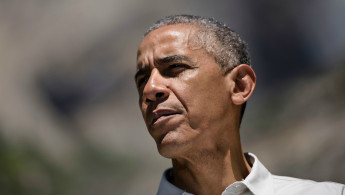Mounting pressure unlikely to sway Obama on Syria
More than 280,000 people have been killed. Millions more have fled their homes.
A relentless drumbeat of cluster bombs, barrel bombs, chemical bombs, murder, rape and torture has turned swaths of Syria to dust.
Humanitarian aid sometimes drips into the beleaguered cities, but when it does, President Bashar al-Assad's regime makes sure "punishment" bombings quickly follow.
"The Assad regime's actions defy all definitions of human decency," said one US official.
There are ominous signs the regime is moving to strangle food production.
In Syria, "you think you've reached the bottom and then you hear a faint scratching from below," another official said.
Through it all, the Obama administration has insisted only Assad – and his Russian and Iranian sponsors – can end the madness.
But privately, even senior diplomats admit that their inability to stop five years of butchery has challenged their conscience. They say that whatever comes next, Syria will have left an indelible stain on their years in public service.
 |
Even senior diplomats admit that their inability to stop five years of butchery has challenged their conscience. They say that whatever comes next, Syria will have left an indelible stain on their years in public service |  |
In a deliberately leaked memo, 51 serving US diplomats have now said "enough," insisting that Obama has a moral obligation to stop the carnage.
To force Assad into real peace negotiations, they say the 44th president must launch airstrikes against the Syrian regime.
Such a policy, they argue, could increase the cost of Assad's intransigence and perhaps stem the suffering.
The White House has quickly signaled it is not ready to embark on such a 180 degree shift.
"The president has always been clear that he does not see a military solution to the crisis in Syria and that remains the case," White House spokeswoman Jennifer Friedman said in response to the memo.
The White House has stuck fast to a credo – borne from the folly of the Iraq war – that the United States should not, and indeed cannot, solve all the world's crises.
 |
The president has always been clear that he does not see a military solution to the crisis in Syria and that remains the case |  |
Above all Obama has tried to avoid entanglements in the Middle East, defining US interests in Syria as part of a counterterrorism effort to dismantle the Islamic State group.
That has left his Secretary of State John Kerry with an unenviable – and probably impossible – task of negotiating an end to the broader crisis with little or no leverage.
His counterparts in Moscow or Damascus know Obama's reticence well, and have the upper hand on the ground, so see little incentive to deal.
 |
The White House has stuck fast to a credo – borne from the folly of the Iraq war – that the United States should not, and indeed cannot, solve all the world's crises |  |
'Morally vacuous, politically bankrupt'
For years diplomat frustration with this perceived fool's errand has been building.
Frederic Hof, a former Syria advisor resigned from the Obama administration in protest in 2012.
Obama's policy is "morally vacuous and politically bankrupt" he said. It "cruelly and gratuitously leaves innocent civilians at the mercy of a mass murderer."
Today, Assad's regime and it's Russian allies are running roughshod over a ceasefire that Kerry helped broker.
Critics say it is increasingly difficult to tell the difference between an imperfect ceasefire and no ceasefire at all.
Similarly, Kerry's efforts to get Russia to force Assad to step down have run into the sand. Russia remains either unwilling or unable to help.
By leaking the memo in an election year, the diplomats would like Obama to reconsider.
They might find allies elsewhere in Washington.
CIA and Pentagon efforts to keep Syria's opposition afloat are faltering, even as progress is made in the fight against the Islamic State group.
Russian aerial assaults on moderate groups have met no response from Washington, forcing allies to seek the protection of larger, better-armed militant groups, including those linked to al-Qaeda.
Might an administration led by Democratic presidential hopeful Hillary Clinton be much more willing to push back against Assad, check Russian influence and bring America's vast military power to bear?
 |
Might an administration led by Democratic presidential hopeful Hillary Clinton be much more willing to push back against Assad, check Russian influence and bring America's vast military power to bear? |  |
There are signs that Russia wants to make sure the next president, whoever it is, faces a choice only between dealing with Assad or letting the extremists.
Russia recently directly targeted US-backed fighters who had no part in the fight against the regime.
"This is a small tribal fighting force that has been pretty well equipped by the United States and tasked with taking the eastern flank of Syria away from the Islamic State," said Faysal Itani, a Syria analyst at the Atlantic Council, a think tank.
"This is as close as you are going to get to a textbook definition of a proxy group."
It's an escalation that may leave US-backed fighters, like Obama's own diplomats, asking what US power is worth.



